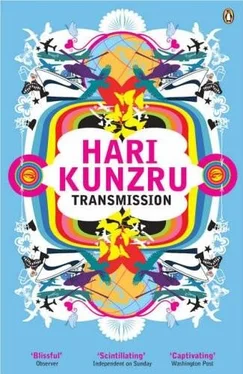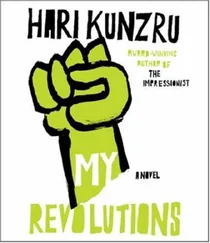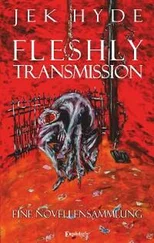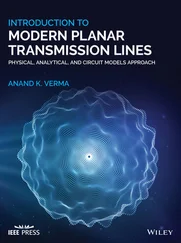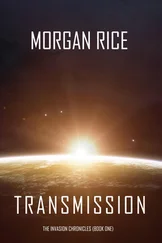Then he was in the passenger seat of a battered pick-up. He was not sure how he came to be there. The driver was a stone-faced man dressed in work clothes, overalls and a checked shirt. They passed between tall trees, the sunlight falling in irregular bright strips across their faces. By the roadside giant billboards advertised a reservation casino. Blackjack. Roulette. Fortune Pai Gow Poker. Keno. 21. Then the trees gave way to strip malls and rows of single-storey houses. The man said nothing, and Arjun could think of nothing to say back to him that was not muddled by the pain in his head. Where are. Who are. Why is. Though the road surface was smooth, the vibration was enough to make him feel nauseous. He closed his eyes.
‘There you go,’ said the driver. They were in a town, parked on a main street of plate-glass storefronts and parading traffic.
‘Is this Canada?’ asked Arjun. The man looked at him strangely, then reached across him to open the passenger door.
‘Bus-station s right there,’ he said. ‘You take care now. You don’t look so hot.’
The man in the pick-up pulled away into the traffic and left him swaying there beside his bag in this town whose name he did not know. He crossed the road to the Greyhound Station, where there was a bus about to depart, and he stood in line with the other passengers until he reached the door and the driver asked where his ticket was. He stood in line again at the booking office, his head throbbing. At the counter there was more confusion. The woman rolled her eyes and clattered her long fingernails on the rim of her keyboard, and he pleaded with her just to give him a ticket for the bus, but she kept saying which bus which bus, and he said the one outside, and finally she sold it to him, making a face at her monitor as if to confide in it that this was the craziest yet in all the day’s long line of crazies.
He took a seat at the back near the rest room. Felt the roar deep in his body as the driver started the engine, then drifted away to an air-conditioned place which became gradually colder, until it seemed to him that he was pierced by slivers of ice, slender arrows which became a forest and eluded every solution except the physical one of shivering them off, which he did, a cascade of ice-needles falling around him like a shedding Christmas tree.
He opened his eyes into stark country, bare prehistoric hills whose yellow backs were cracked open in places by dark ravines. Giant pylons walked away to the horizon, the only human sign in the bleakness. Sitting beside him was an elderly man in a white shirt buttoned up to the neck. He was reading a religious tract, scrutinizing the pamphlet with great care through a pair of wire-rimmed spectacles.
‘Where are we?’ Arjun asked.
‘Almost there,’ said the man.
Then the ice-forest of his dream was replaced by a real one, trees pressing in towards the road like a green mob coming down from the hills. Above them stood a mountain with a smear of snow on its peak, and the road ran on towards it, and the engine roared, and the old man said, ‘Even in these last days it is not too late to dedicate your life to the Lord.’
‘What time is it?’ asked Arjun.
‘The time of apostasy, young man. The Tribulation is on its way. You may be nothing but a hell-bound sinner, but if you dedicate your life to Jesus Christ and get born again, even now it is not too late.’
‘This must be Canada,’ said Arjun, and the old man became an abstraction of an old man, a landscape graph of energies and potentials which could be flattened into silence. Then it was evening and there were lights and behind him someone had a transistor playing country music and the old man had turned into a fat black woman in pink stretch pants who spoke to him in a language he did not understand. The streetlights slowed down and finally came to a halt. As the hydraulic brakes gave a last gasp and the bus settled, she stared at him with an evil stare, then pushed past him into the aisle.
‘You asshole,’ she muttered. ‘What is your problem?’
He saw that his bag was open and started to panic about money, about all the cash he had withdrawn from his checking account since you have to have cash because they can trace you with a card. But it was still there and the driver told him to get off the bus now and he walked down the steps to find himself in Bend, Oregon. He had gone the wrong way.

In London, Leela had taken away the power. She corrupted data at the New Cross and Littlebrook substations, seducing the control software, whispering you are overloaded, trip the circuit-breakers, shut down the lines. Across the city trains slowed to a halt, traffic lights dimmed, and household appliances failed to respond to their angry owners. As night fell, the street lighting did not come on. Opportunities were seized. Bricks went through windows. Padlocks were forced and back fences climbed. From the highest penthouse of the In Vitro building, the West End looked like a chessboard, alternating squares of light and dark. The estate agent and her client looked out from the balcony and were afraid.
They checked their messages. When they turned to go, they found the lifts were dead. Reluctantly they began the twenty-flight walk downstairs, feeling their way by holding on to the banisters. After four flights the estate agent took off her shoes. After seven the client called out to her, asking was she still there, could they stop for a while to rest. Somewhere below their feet, firemen in reflective clothing led dehydrated commuters through a darkened underground tunnel, towards the orange glow of platform emergency lighting.
Eddies ran through the national grid, echoes of Leela’s voice. In parts of East Anglia, Wales and western Scotland, there were momentary breaks in transmission. For a second, no more, the Clansman’s Lodge went dark. Then the power came back. Digital timers started to flash. A burglar alarm began to ring in the office. Gaby glanced at the bedside lamp and lay back on the bed, watching Rajiv Rana’s naked back. While she was talking to Guy, someone had called Rajiv too, and now he was speaking rapid Hindi into his mobile, one hand fiercely scrunching up a pair of her knickers.
He stood up and went into the bathroom, slamming the door behind him. She could hear him raising his voice, arguing with the person at the other end. She slid a hand between her legs and turned on to her stomach, trying to decide what she felt. There were red fingermarks on her arms where he had held her down. She smelled of spermicide and aftershave.
It had been inevitable, she supposed. That morning the crew had appeared tired and agitated, muttering about the bland food, the rain. There had been a lot of activity in the corridors during the night, and at breakfast people were saying that one of the dancers was on a train home to Birmingham, upset at something that had happened. Rob D. had an unexplained black eye, the waiting staff were rattling the plates and on her way back up to her room she noticed a handyman taking a bedroom door off its hinges. Someone had kicked a hole through one of its lower panels.
Leela was still claiming illness, and the doctor had again been summoned to pronounce that he could find nothing physically wrong. At the morning production meeting Iqbal announced that Mrs Zahir was flying out from Mumbai but had been held up by an air-traffic control shutdown. When the mother arrived, he said darkly, she would soon settle the girl’s problems. Rocky Prasad and the unit were told to make the best of the break in the weather and drive out to shoot scenery.
Prasad, in the first display of directorial personality Gaby had witnessed from him, shouted that he had had enough. ‘Are you going to let her do this to me? One call to your friends in Karachi, one call and you could make it stop!’ Iqbal slammed his fist down on the table. There was an ugly silence. He turned to Gaby and gestured for her to leave the room.
Читать дальше
